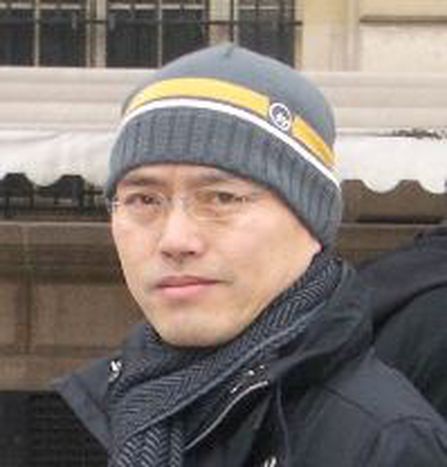
EU-China: 'Time for balance, not envy'
Published on
Translation by:
 kate stansfield
kate stansfield
In seeking greater loyalty from the Asian giant, Benita Ferrero-Waldner, EU Commissioner for External Relations, launches a new cooperation agreement in China this week. What do we Europeans know about the Chinese?
'Europe must get China right - as a threat, an opportunity and prospective partner.' These were EU Trade Commissioner Peter Mandelson's words on October 24, 2006, the day after the Commission approved a new strategy for EU-China relations. We hear Chinese businessman Yongyang Wang's experience on the continent.
Wang was drawn to Spain fifteen years ago by his admiration for Western culture; its manners and elegance fascinated him. He had a high price to pay, as at the time he had no legal way of leaving China; he had to leave everything behind.
Having started out as a waiter, today he has his own legal consultancy in the centre of Barcelona. Many come to him in search of legal information that they don't otherwise receive from the councils. 'They treat us as if we are an official body,' he smiles. They assist all kinds of clients, although in the future he would like to specialise in Spanish companies with business interests in China. He was born on January 22, 1964, the year of the rabbit. But his warm, lively eyes in his serene face are still youthful. 'In China, as soon as you reach forty, people treat you as if you're elderly,' he explains. 'It would be difficult to go back now that I've adapted to life here.'
Japanese to save time
In the Chinese restaurant Confucio, waitresses come and go in fuscia-coloured shirts; noodles and soups; rice and fish in a fishtank. Wang usually eats here because the restaurant is close to his office.
It has not been easy to get where he is today and, although he hasn't felt rejected, he does recognise that a lot of stereotyping and suspicion exists with regards to the Chinese community. 'The very noun 'Chinese' has negative connotations,' he states without dropping his smile. 'I'm thinking of Chinatown (the Barcelona neighbourhood where the underworld and prostitution are traditionally at large), for example, which has nothing to do with us; or the stereotypes and urban legends that circulate about the restaurants, the mafia... Distrust is the worst. It makes it difficult to rent an apartment, set up a business or take a girl out dancing. I even know some Chinese people who pass themselves off as Japanese,' he confesses, though he hasn't done this himself.
Fear of change: a Western notion
Doesn't it seem to him that European societies are starting to appreciate oriental culture? Wang puts me in my place again. 'Westerners don't appreciate the true Chinese culture, only the clichés, the exotic image of a country that doesn't exist.'
Looking at the international scene, and the fear Europe and the United States have of Chinese growth, Wang's eyes narrow as he exclaims: 'fear of change is a Western concern.'
Wang is from the city of Wangzhou, an area which produces the majority of our textile imports. Asked about the controversy surrounding the fear of an invasion of Chinese products, he reflects for several minutes whilst he takes a sip of his soup. 'In Europe, many have ended up benefiting from the way China has burst onto the markets.' For Wang, this is the 'time for balance, not for envy; the 'central country' is far from reaching Western levels.'
Tiananmen remembered
He left China unhappy with the government. He lived the Tiananmen episode by never tearing his eyes away from the television screen, crying. 'Now I've forgiven it,' he announces frankly. China has evolved a great deal in recent years and he believes that without that mistake, its current development would not have been possible. 'Maybe the wealth could be better distributed,' he admits, 'but everyone has received something and is happy about it,'
And democracy? 'It will arrive sooner or later,' he says, 'the government will adapt little by little.' This slow pace is necessary, according to Wang, because China has no democratic tradition. 'You, the Europeans, had the Romans, you had Greek cities. But the vote doesn't mean anything to many people from rural China.' The solution, according to Wang, is to improve and spread education.
Talking, studying, dancing
He arrived unable to speak a word of Spanish, although nobody would guess that if they listened to him now. He speaks slowly, and is clearly a born talker. Precisely one of the things that he likes most about Spain is that it is possible to strike up interesting conversations with people. 'In China we are not used to expressing our ideas and feelings; very few people do it.'
Wang combines his work in the consultancy with an Open University Law degree in Spain. He is aware of the need for lawyers who are able to speak Chinese and Spanish. Later, in the evenings, he learns to dance salsa between sips of mojito in the Agua de Luna salsa bar. He knows all the best salsa joints in Barcelona. He's been dancing for years. Yet girls are surprised when they see him. They think that a Chinese man is going to make them look a fool, but when they see him on the dance floor they soon change their mind. Will the same happen to Europe with regards to China as a whole?
Translated from UE-China: “El momento de equilibrar, no de envidiar”


